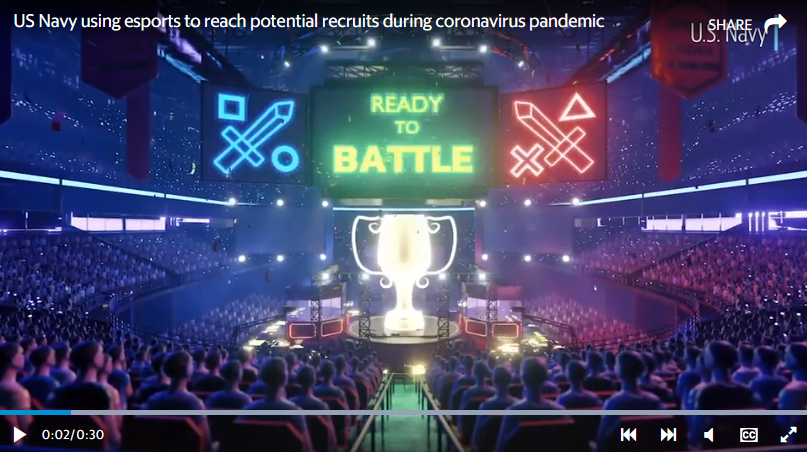
By Tara Copp
From McClatchy | Original Article
Military recruiters are relying on video games like “Call of Duty” and other online outreach to encourage young men and women to enlist during the coronavirus outbreak that has sharply curtailed more traditional recruiting efforts.
May and June usually kick off the busy summer season for military recruiters as high school seniors who recruiters had spent months meeting on campus graduate and consider enlisting.
Top military officials have expressed concerns about meeting recruiting goals during the pandemic which has closed off opportunities for recruiters to find prospects in person.
To find new soldiers, five Army recruiters in New York have been running a 30-day “Call of Duty” video game tournament. This March, the Navy launched its esports team, “Goats and Glory.” Navy sailors who made the team are skilled video game players who are then trained as recruiters to meet prospects on virtual battlefields like “Fortnite” and “League of Legends.”
The Marine Corps launched a phone app called “Squad Bay,” with leaderboard fitness workouts and information sessions to keep potential recruits feeling connected to the idea of boot camp.
“Digital contact is a prospecting activity that has shifted from a supporting tactic to the main effort during the restrictive COVID-19 environment,” the Marines said in a statement to McClatchy.
Despite the online push, the numbers of young men and women signing up for military service has fallen, at least in the short term.
“In March 2020 we saw a 45 percent reduction in qualified leads and prospects, and we expect similar results for April,” the Navy said in a statement to McClatchy. The drop in leads has meant fewer new sailors – the Navy said it had about 1,500 fewer recruits from January through April 2020 compared to the same timeframe the year before.
The Marine Corps and Army also said in statements to McClatchy that their recruiting numbers had dropped compared to this time last year. The Air Force did not say whether their recruiting numbers had been impacted, but said they expect to end the year with about 3,000 fewer service members than they had anticipated.
The decline is being closely watched because even a short-term loss in recruiting numbers can have a long-term impact on military size.
Maintaining a force of 1.3 million active duty personnel relies upon the military attracting enough new recruits and retaining enough experienced service members each year to match the number of forces retiring or leaving the military.
“I think in reality we are going to be somewhat short of the end strength goals,” defense under secretary Matthew Donovan, the Pentagon’s head of personnel and readiness, told reporters at a Mitchell Institute discussion last week.
The current economic uncertainty and high unemployment may ultimately help military recruiting, but it will be a few months before there’s data to know for sure.
“Traditionally a bad economy is good for recruiting,” said Nelson Lim, a senior social scientist at the Rand Corporation who has researched military personnel policy for more than two decades. “When the economy tanked [in the 2008 recession] retention went up and recruiting got easier.”
The military is now looking at retention as a short-term solution for the drop off in recruiting by trying to convince currently serving military personnel to renew contracts or temporarily extending the service contracts of personnel who are near the end of their time in uniform.
“We’ve seen an increase in retention,” said Sergeant Major of the Army Michael A. Grinston, the service’s top enlisted soldier. ”We’re at over 100 percent – we met our goals in March, April – our retention goals.”
So the Army looked to retention as a tool to make up for the potential shortfall in recruiting.
“So I said, ‘OK, can we get 2,000 more quality soldiers?” Grinston said. The Army looked at those service members who were ending their military service within the next few months and began to reach out.
“Two weeks ago we’d already hit 500,” Grinston said.
The Marine Corps said it has already met 97 percent of its retention goal, and also said it is looking at offering additional extensions to some Marines who are at the end of their military contracts in order to make up for coronavirus recruiting shortfalls.
Lim said RAND is currently running mathematical models for the Army to advise its virtual recruiting, based on its previous data on how many times a recruiter, TV advertisement or social media outreach has traditionally had to make contact with a prospect to get them to enlist.
But Lim cautioned that there was still much unknown about the impact of the coronavirus. The recession of 2008 “was a traditional kind of environment, even though it was very severe. It was the kind of environment we know. This one is brand new.”
Without a vaccine, recruiters are preparing for the possibility they may have to keep finding future service members through mostly virtual means for many months to come.
“We think these constraints are going to be with us until we have a vaccine,” Donovan said.
That prospect has the Pentagon’s top leadership worried.
Defense Secretary Mark Esper on Monday said while the military has been able to protect the majority of its personnel from catching the virus, the reduced ability to recruit new young people into service worried him.
“What concerns me more would be the long-term impacts as we’ve had to make adjustments to our recruiting and basic military training,” Esper said. “I do not at any time want to shut off the pipeline because that could have ramifications that can affect us for months to come, years.”

